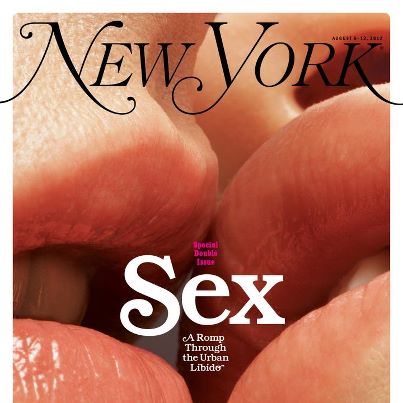This week New York Magazine printed an issue dedicated entirely to boning. Did you know? And guess what? It’s not entirely about heterosexuals in missionary position — there are so many more perspectives than that. And my guess is that the New York Magazine Sex Issue will give you feelings, because it gave me feelings.

It was odd, reading these articles. There is so much right with them — the article “He & He & He“, for example, spotlights the work and home life of Benny, Jason and Adrian, a “throuple,” or three men in a polyamorous relationship. They collectively own and run Cockyboys, a gay porn company, and otherwise do very “normal” things, like crochet and raise dogs and collect art. The article does such a fantastic job of presenting three well-rounded human beings that work in the sex industry and really normalizes polyamory: Paper’s Drew Elliot is quoted as saying “It’s amazing. It’s modern. There’s nothing sensational about them — the relationship isn’t theater. It just works.”
They also acknowledge that bisexuals exist. That’s something they totally did right. This is not a publication that participates in bisexual erasure:
I told my dad first. When I said I was dating a woman, he said, “Oh, so you’re a lesbian.” I said no. Then he kind of wiggled his hand and said, “So you’re kind of like this, huh?” He understood.
Or the adorable photos of young couples kissing by Richard Kern. They’re just cute, and one of the couples is gay (and also effing adorbs.)

So why was it odd, if there was just so much right? Reading along, having lots of sex-positive feelings, and then WHAM. Problematic statement. There’s the jarring gender essentialism:
Sometimes, if I’m with a man, I’ll miss the emotional connection and nurturing that I’ve found women are more likely to offer. Or if I’m with a woman, I can miss the way a man can take charge. –from Bisexual Testimonials
The slightly strange use of a trans* identity in comparing masculine and feminine aspects of a cisgender man:
Dressed in a formal shirt and suspenders, he is as two-dimensionally thin and neatly pressed as an envelope. “I wouldn’t be shocked if I learned that he was the world’s most convincing female-to-male transsexual,” Boardman says. –from He & He & He
The idea that the world and societal norms are default heterosexual and that any deviation is purely imitation:
Surrounded by couples (lesbians and gays getting married and having children, imitating, ironically, all these years later, their straight brethren), she is mostly comfortable still reveling in the chase. –from Sex: The Multiplicity of Desire
Or the entire “Married Sex” article, in which the couple is at best constantly thwarted when they try to have sex, or at worst just not that into each other. That one’s less problematic and more a bit of a bummer.
Despite the gender essentialism, the occasional sex worker negativity and misogyny, and even this bizarre conflation of butch, stone and trans* identities that Sex: The Multiplicity of Desire takes part in, it’s a wonderful read filled with quite a few different examples of people, lives and perspectives. Fascinating. And it’s worth noting that a lot of the problematic statements come from those who are interviewed, and not necessarily from the journalists themselves.

Sex is a difficult thing to write about because there are about as many facets to sex and sexuality as there are people on the planet. More even, because human beings can be capable of changing their sexuality and sexual proclivities as often as they change their underwear. No one article can encompass sex and all the perspectives on it. Not even a collection of articles as well-chosen and well-written as this one can do it. Most people make problematic statements about sex because their views are based entirely on personal experience — at what other point do you really get to experience someone else’s sex? That’s why mainstream publications need to be doing what New York Magazine is doing: collecting experiences so that there isn’t one authority out there and making them publicly available to incite discussion. Sex makes up a good deal of our lives — let’s start talking about it. Writing about it. Having real discussions about sex. In U.S. culture, sex is often looked at as worse than violence on the shame-scale. Talking about sex, all different kinds of sex, removes the shame and allows us to move past these often problematic attitudes surrounding pleasure. The very presence of this publication lets us find our own reflections in the experiences of others and provokes conversation about a commonly taboo topic. I commend New York Magazine for even touching a topic that can be so incendiary, problems included.







